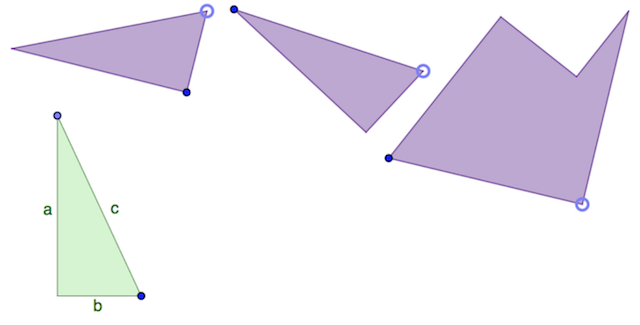Hello,
I'll be traveling a fair amount in April (New York, Atlanta, DC), and again in the summer. In this issue of the newsletter, after the usual links to new stuff on my blog and Web site, I announce some of the workshops and other events I will be attending. Maybe I'll see some of you there? More info below.
On with the newsletter.

Blog Posts: Mapping Out Curriculum
Here are links to posts on my Math Education Blog that you might find interesting.
If you are so moved, you may comment on the posts, and/or subscribe to the blog.
Mind Maps
Many people are under the illusion that math is intrinsically sequential, with counting at the beginning, calculus at the end, and a strictly logical sequence of topics from one to the other. They are terribly mistaken. Organizing math in such a logical sequence really can't be done, as topics branch out in different directions.
This is also true even if we limit ourselves to school mathematics, because strategically navigating between topics is an essential part of good teaching. In addition, good teaching requires making connections, exploring examples, and using various learning tools. At various times, I have used a "mind map" to show the relationships between various aspects of school mathematics. I call this framework "Themes, Tools, Concepts". I give a couple of examples in this blog post.
Sequencing
Still, even though the connections between topics, applications, and representations are multiple and complex, curriculum needs to be sequenced somehow, as one page follows another in a book, and one day follows another in the classroom. Alas, traditional curriculum sequencing was often developed with little attention to what actually works for student learning. I suggest general guidelines for sequencing curriculum here.
(See also two relevant posts from 2015: Pruning the Curriculum, and Mapping Out a Course.)
Vocabulary
One point I made in the post on sequencing generated objections on Twitter. I had suggested that the concept should come first, only to be followed by an introduction to vocabulary and notation later, when students were ready for that. Some readers argued that sometimes it's a good idea to start a lesson with a definition. I certainly don't rule that out! Read the discussion here.
MathEducation.page
New on my Web site.
Pythagorean Home Page

The Pythagorean theorem, of course, is a cornerstone of school mathematics. Thus, it is important to approach it in a variety of ways. I added an online puzzle to my existing animated applets and paper-pencil activity, and to the geoboard / dot paper approach in chapters 8 and 9 of Geometry Labs. None of these things are substitutes for a logical proof, but using one or more can help students get ready for such a proof, or review it later on. See also a discussion of the role of an experiential component in learning mathematical concepts: The Pythagorean Geoboard.
All these links are on my Pythagorean home page.
Symmetric Polygons
I wrote this activity with Lew Douglas. It could be a stand-alone activity, to help develop students' understanding of symmetry and deepen their familiarity with the special polygons. Or it could be used as a foundational activity in a unit about special polygons.
In such a unit, the properties of special polygons can be deduced from their symmetry definitions. For example, "The diagonals of a parallelogram bisect each other." Conversely, certain properties can be shown to be sufficient to prove a given polygon is special. For example, "If the diagonals of a quadrilateral bisect each other, the quadrilateral must be a parallelogram." In a transformations-based geometry course, this would not require the use of congruent triangles. We have been developing the logical backbone of such a course and posting our work in progress here, along with curriculum materials for grades 8-11, and several articles for teachers and curriculum developers.
For Teachers and Teacher Trainers
My Web site includes a lot of material for classroom use, as well as articles about pedagogy. I link to the latter on my Teaching home page.
- But that is not all! The site also includes curriculum that is written for teachers to deepen their subject content expertise, in three ways:
- Concept Analysis: looking at familiar content from an unfamiliar point of view.
- Problem Analysis: going deeper into problems that are initially intended for the classroom, by seeking generalization or proof.
- Formal derivation of results we often take for granted.
- Find links to all this on my Teachers' Mathematics page.
See if any of this would be useful for your department's professional growth! Oh, and one more thing along these lines: I was asked to write a teachers' introduction to the geoboard, and came up with two versions: one page, or two pages.
